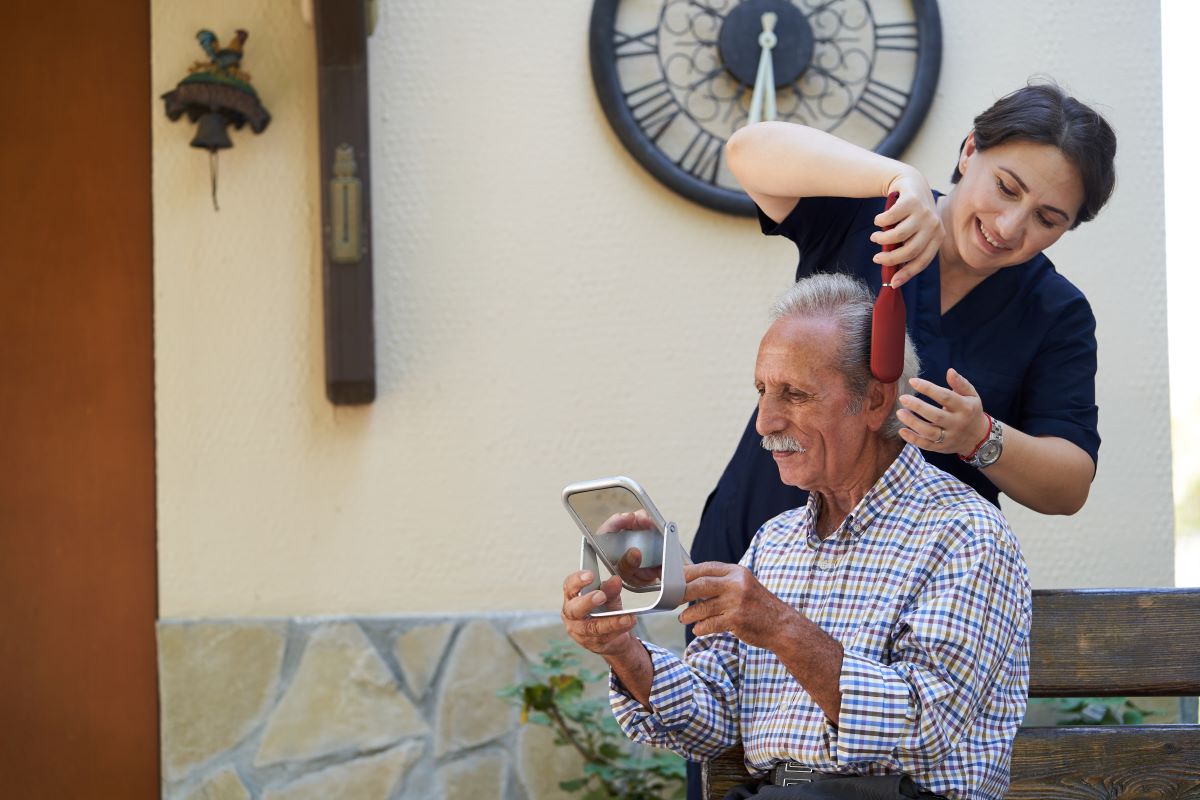7 Essential Caregiver Interview Questions to Ask

Many long-term care facilities elicit the support of professional caregivers to round out their direct care nursing teams. A caregiver has the skills and training to assist older adults with activities of daily living (ADLs), provide companionship, and so much more. The care they provide helps to reduce the workload for nurses and CNAs in busy healthcare facilities.
If you’re hiring a caregiver to join your team, utilizing a well-written job description and an organized interview process will ensure you find the right candidate. In this guide, we share the top caregiver interview questions to ask applicants so you can hire the most qualified candidate. We also provide a free downloadable candidate evaluation form to help you assess interview responses.
Need additional job market insights? See what qualities other facilities are currently looking for in their caregiver job postings.
Interview Questions for Caregivers and What Their Answers Reveal
Caregivers are trained professionals who provide emotional and physical support to older adults. They may work in the homecare setting, such as private duty or home health, or in a healthcare facility. When hiring a caregiver for a long-term care setting, the interview process is an opportune time to get on the same page with the candidate about the expectations for the role.
You may be interviewing a caregiver without formal healthcare experience — that’s okay. Asking targeted interview questions for caregivers will give you a sense of the candidate’s trainability and willingness to learn. Prepare for your next interview by reviewing these questions to ask caregivers for elderly patients or residents.
1. Recall a time you went above the call of duty for a patient. How did it impact them?
Whether you’re conducting an interview for a licensed nurse or unlicensed assistive personnel, it’s beneficial to start out with a positive question that reveals the candidate’s strengths. This ice-breaker question inspires the candidate to reflect on their passion for taking care of people. It also allows the candidate to discuss their perception of the responsibilities required for the role. If there’s a misunderstanding about the job duties, now’s a good time to clear things up.
2. What would you do if a patient’s family disagreed with the care you provided?
Delivering customer service in healthcare often means diffusing situations where a patient or their family member disagrees with a care provider. Ensure your candidate is capable of remaining courteous and professional during these types of encounters.
There’s no right or wrong answer to an emotional intelligence interview question. As a hiring manager, you’re looking for a response that shows the caregiver adapts well to change, communicates, and collaborates well within a healthcare setting.
3. Name a time you worked as a team to accomplish a goal. What was the outcome?
In any healthcare facility, teamwork among the direct care team is essential to delivering safe patient or resident care. On a given shift, caregivers may be required to take direction from RNs, LPNs, CNAs, and other healthcare staff.
By asking a team player interview question, you can evaluate the candidate’s ability to function within a team. Keep in mind, a caregiver may come from a setting with a much smaller team, such as a private duty role. Having a team player attitude may be more important than experience in a team.
4. What does workplace professionalism mean to you?
Open-ended questions for caregivers allow the candidate to reflect on their personal belief systems, which is important when discussing professionalism. The Department of Labor defines professionalism as conducting oneself with integrity, accountability, responsibility, and excellence. Examples of professionalism in a caregiver role may include:
- Arriving to work on time
- Communicating effectively
- Taking direction from team members
5. How would you handle a patient who is resistant to care?
Older adults may be resistant to care for a number of reasons. Whether they’re out of their comfort zone or experiencing geriatric behavioral health challenges, it’s important for a caregiver to respond in an informed way. This question measures their sense of empathy and emotional intelligence when problem-solving in patient care.
6. Do you have experience providing medication reminders?
Near the end of the interview, it’s appropriate to ask another question to gauge the candidate’s understanding of the role. Caregivers are often responsible for reminding residents to take their medications. However, medication administration is a responsibility given to licensed nurses or certified medication aides. Asking skills-based caregiver interview questions helps identify knowledge gaps in the expectation for the role.
7. How would you handle an emergency situation with a patient or resident?
It’s important to ensure that a caregiver will appropriately respond to a patient or resident emergency.
These types of caregiver interview questions aren’t a knowledge check; instead, they’re a way to measure their ability to follow the chain of command and make decisions under pressure. Reassure the candidate that in your healthcare facility, they have the support necessary to respond to an emergency if needed.
Looking for Quality Caregivers?
If you’re looking for suitable candidates who can answer your caregiver interview questions, IntelyCare is here to help speed up the hiring process. Post to our nationwide job board today and reach qualified applicants faster.

